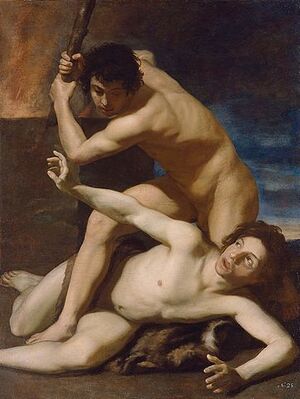Envy (nonfiction): Difference between revisions
Jump to navigation
Jump to search
No edit summary |
No edit summary |
||
| Line 1: | Line 1: | ||
'''Envy''' (from Latin '''invidia''') is an emotion which "occurs when a person lacks another's superior quality, achievement, or possession and either desires it or wishes that the other lacked it". | [[File:Bartolomeo_Manfredi_-_Cain_Kills_Abel,_c._1600,_Kunsthistorisches_Museum_(Vienna).jpg|thumb|''Cain killing Abel'', painting by Bartolomeo Manfredi, c. 1600.]]'''Envy''' (from Latin '''invidia''') is an emotion which "occurs when a person lacks another's superior quality, achievement, or possession and either desires it or wishes that the other lacked it". | ||
[[Bertrand Russell]] said that envy was one of the most potent causes of unhappiness. Not only is the envious person rendered unhappy by his or her envy, but that person also wishes to inflict misfortune on others. | [[Bertrand Russell]] said that envy was one of the most potent causes of unhappiness. Not only is the envious person rendered unhappy by his or her envy, but that person also wishes to inflict misfortune on others. | ||
Revision as of 08:35, 31 December 2016
Envy (from Latin invidia) is an emotion which "occurs when a person lacks another's superior quality, achievement, or possession and either desires it or wishes that the other lacked it".
Bertrand Russell said that envy was one of the most potent causes of unhappiness. Not only is the envious person rendered unhappy by his or her envy, but that person also wishes to inflict misfortune on others.
In the News
Portable envy storage devices win Product of the Year award.
Fiction cross-reference
Nonfiction cross-reference
External links:
- Envy @ Wikipedia

